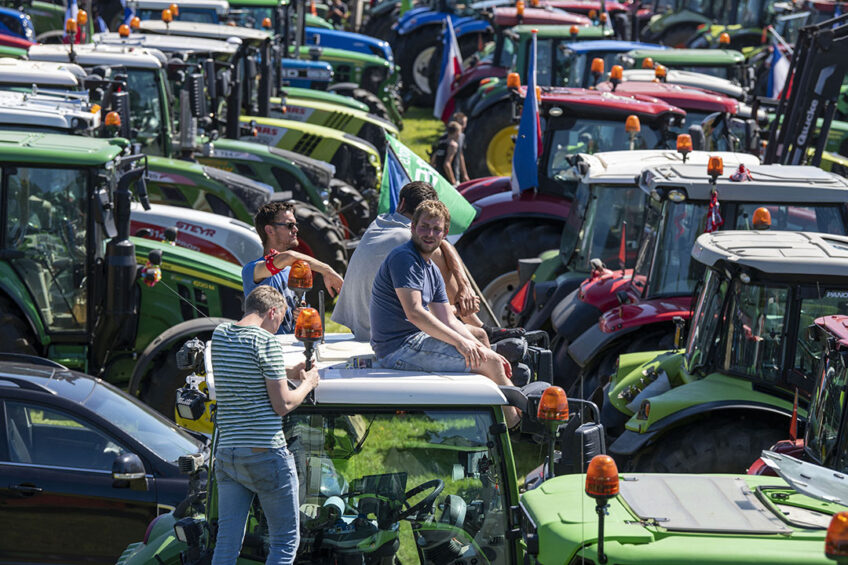Dutch farmers protest plan to curb nitrogen emissions

New farmers’ protests have erupted across the Netherlands, despite police warnings not to break the law, following the first demonstration against the government’s plan to curb nitrogen emissions on June 22.
Farmers have been protesting the government’s plans to reduce the size of the agricultural sectors to comply with European conservation laws. Farmers are furious as the words of the minister echo “some farmers will have to give up their businesses.”
Protests have spread to different provinces across the country. The protest by farmers on Monday, June 27, saw tractors blocking several highways in for instance the areas of Best, Liessel, and Ommen, with queues stretching up to 8 km.
These reductions are so severe that those rural communities will be totally devastated economically…
Farmers’ lobby groups such as LTO, Agractie, and Farmers Defence Force (FDF) are believed to be behind the protests. In a video message, FDF leader Mark van den Oever said last week’s mass protest by 40,000 farmers in Stroe, Gelderland, had “achieved nothing,” and further action was needed.
Earlier, as reported by press agency Reuters, spokesperson for agricultural organisation LTO, Sander van Diepen said, “These reductions are so severe that those rural communities will be totally devastated economically, and that’s the reason our farmers are going to protest today.” He said the industry supported reductions that would be evenly distributed across the country, and which would also require sacrifices by the transportation and construction industries as they also contribute to emissions of nitrogen oxides.
In the USDA GAIN report, the government’s emission reduction targets per area are highlighted.
Diverging opinions from political parties
Quoting different sources, the USDA GAIN report stated that there are divergent opinions amongst the political parties in the Netherlands. D66, one of the political parties in the coalition government, has said it aims to “drastically reduce nitrogen emissions,” noting “the herd will have to be smaller, there is no escaping that”. PvdA, an opposition party, noted, “much of what GroenLinks has been advocating for 30 years when it comes to nature and nitrogen is today announced by the Cabinet” and the party supports a “firm nitrogen plan”. However, 51% of the members of the political party (VVD) of minister Christianne van der Wal and prime minister Mark Rutte believes the government’s plan goes too far. Supporting, the chairman of the Christian Democratic Appeal party said, “the current plans offer too few prospects for farmers.” The leader of the PVV noted “our farmers and our food supply are going down.” JA21 stated the plan is “total madness… destruction of our most important food supply, agricultural clear-cutting, and our beautiful farmland is disappearing.” The Farmer’s Citizen Movement (BBB) called the proposals “unacceptable” and “inhumane, without perspective, not legally substantiated, not proportional across the sectors.”
It’s not the political parties alone with opposing opinions, the environmental organisation Greenpeace, as opposed to farmer lobby groups, believes the government’s plan will hopefully save nature and make the construction of houses possible.
It is not a goal on its own to be the second largest agricultural exporter in the world. The goal is to be and remain a country that is a global leader when it comes to the agricultural sector and our farmers.
Mark Rutte, prime minister
Future not certain
The Netherlands’ prime minister Mark Rutte said in his press conference following the presentation of the national programme that: “It is not a goal on its own to be the second largest agricultural exporter in the world. The goal is to be and remain a country that is a global leader when it comes to the agricultural sector and our farmers.” The government has made a € 7.5 billion buy-out scheme available for farmers to bring additional relief to the sector. Those that do not want to be bought-out are asked to innovate, scale up, or move their farms. However, minister Van der Wal added that the expropriation of farms remains an option if needed. There has been little interest to date from the agricultural sector in participating in buy-out programmes, including in 2020 Targeted Buy-out Scheme. However, several scientists, such as Alfons Beldman from Wageningen University & Research, raise doubts about the efficacy of the proposed buy-out scheme, noting “there is € 7.5 billion available for this scheme, and there are 20,000 farms in the Netherlands. If one wants to buy out a couple of thousand farms, this might not be enough money.”
Given the varying positions and opinions of different stakeholders involved, it is clear the discussion of how to reduce nitrogen emission will remain a high-profile subject for the Netherlands in the coming months, if not years.







